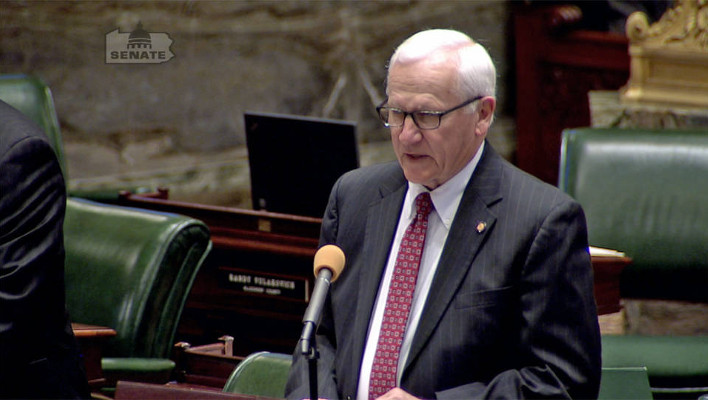HARRISBURG – State Sen. Gene Yaw (R-23) has reintroduced legislation to increase conservation and technical assistance for farmers in order to further reduce pollution impacts on local creeks and streams. The bill, Senate Bill 465, along with separate legislation known as the “Clean Streams Fund” announced earlier this week by Yaw and Republican colleagues, would work to restore and improve Pennsylvania’s waterways and clean water efforts.
“Agriculture is looked to for significant reductions to meet pollution reduction goals for the Chesapeake Bay and other major watersheds in the state,” Sen. Yaw said. “Nevertheless, almost one-third of our Commonwealth’s streams do not meet standards for drinking, fishing or recreation, and agriculture remains one of the largest sources of impairment. To meet the challenges, I have again introduced legislation to establish an Agricultural Conservation Assistance Program.”
Senate Bill 465 will provide for local county conservation districts (CCD’s) throughout the Commonwealth to directly receive and manage funding for agricultural conservation projects determined by local officials in order to significantly improve local water quality. Modeled after the state’s Dirt and Gravel Road Program that apportions funding to CCD’s based on a formula that considers relative volumes of dirt roads and impaired streams in each district, the program would apply similar criteria in driving targeted dollars to areas with the highest need for improvement. CCD’s would work with participating farmers and landowners to determine the best management practices that will work best for their area.
Senate Bill 465 is a collaborative effort of governmental and non-governmental representatives, including the Pennsylvania Farm Bureau (PFB), the Chesapeake Bay Foundation (CBF) and Penn State University.
“Pennsylvania farmers have long been conservation minded and manage their farms in a way that protects natural resources,” said PFB President Rick Ebert. “However, challenges remain in meeting water quality goals, especially within the Chesapeake Bay Watershed. We are pleased that lawmakers such as Senator Yaw acknowledge that farmers cannot go it alone, while also recognizing that environmental challenges are not going away. This agriculture conservation bill will help farmers make conservation improvements on their farm and bring Pennsylvania closer to meeting those water quality goals.”
“Farmers are willing to do the right thing and conservation districts are standing by to help. But both lack the resources. CBF thanks Sen. Yaw for an important first step,” said Shannon Gority, CBF Executive Director in Pennsylvania. “Everyone wants agriculture to succeed and it is long past time that it gets the resources and technical assistance to finish the job. Our economy, health, heritage, and quality of life depend on it.”
“Agricultural water quality has been a priority issue in Pennsylvania and our college for many years,” stated Richard Roush, Dean of the Penn State College of Agricultural Sciences. “We enjoy long-standing relationships with diverse agricultural and conservation associations that share our passion for this issue. We believe arming Pennsylvania farmers with the latest science-based information, best practices, and technical support in their conservation efforts will reap huge dividends for healthy rivers, but also for farmers in making better use of soil and nutrients.”
“Given the challenges of meeting a 2025 deadline to have all practices in place to meet the Chesapeake Bay cleanup plan, now is the time for Pennsylvania to enact legislation that will provide a roadmap for meeting those goals,” Senator Yaw added. “I look forward to a vote on this bill in the near future.”
Senate Bill 465 has been referred to the Senate Agricultural and Rural Affairs Committee for consideration.
For more state-related news and information, visit Senator Yaw’s website at www.SenatorGeneYaw.com or on Facebook and Twitter @SenatorGeneYaw.
Senator Gene Yaw represents Pennsylvania’s 23rd Senatorial District, which includes all or portions of Bradford, Lycoming, Sullivan Susquehanna and Union counties.


